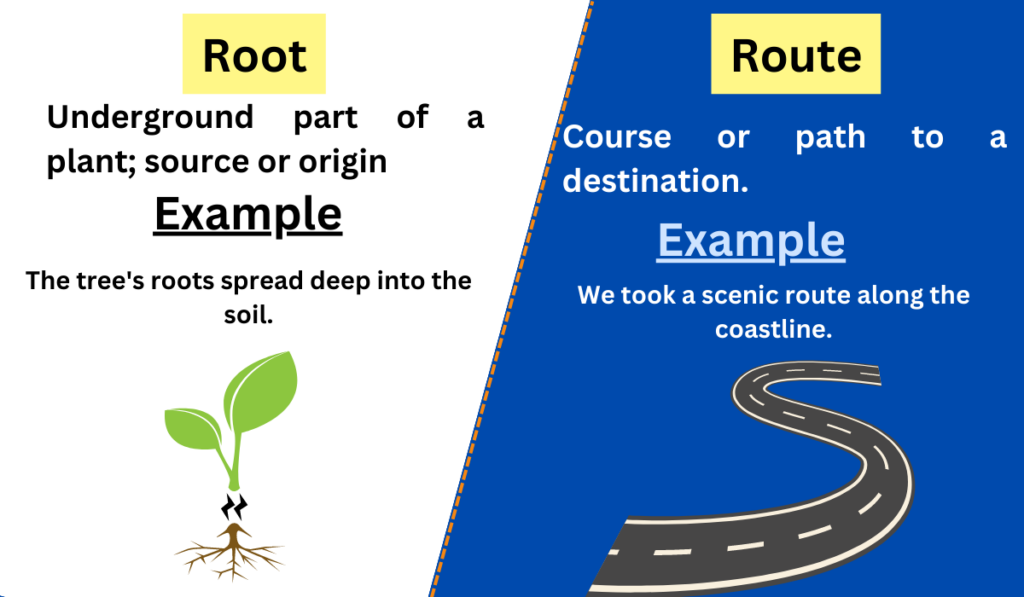Root vs. Route-Difference between And Examples
In the English language, words that sound similar can often have different meanings and uses, leading to confusion among speakers. One such pair is “root” and “route.”

Although they may sound alike, they have distinct definitions and contexts. This article aims to clarify the differences between “root” and “route” to help individuals understand and use them correctly.
Let’s explore the meanings and applications of these words to grasp their proper usage.
Meanings and Examples
Root Definition
Definition: “Root” is a noun that refers to the underground part of a plant that typically absorbs water and nutrients. It can also represent the source, origin, or fundamental cause of something.
Examples of Root
- The tree’s roots spread deep into the soil.
- Understanding your family’s cultural roots can provide a sense of identity.
- The company’s success has its roots in innovative thinking.
Route Definition
The Definition of Route is,
Definition: “Route” is a noun that denotes a course or path taken to reach a particular destination. It can also be used as a verb to describe the action of planning or directing a course.
Examples
- We took a scenic route along the coastline.
- The bus driver knows the best route to the city center.
- She routes the packages to different departments for delivery.
Difference between Rot and Route
| Category | Root | Route |
| Meaning | Noun: underground part of a plant; source or origin | Noun: course or path to a destination; verb: plan or direct |
| Example | “The tree’s roots spread deep into the soil.” | “We took a scenic route along the coastline.” |
| Usage | Plant anatomy, origin or source, fundamental cause | Navigation, travel, planning or directing a course |
| Context | Botany, genealogy, history, underlying causes | Directions, transportation, logistics, planning |
Usage in a Paragraph
The term “root” refers to the underground part of a plant that plays a vital role in absorbing water and nutrients from the soil. It serves as an anchor, providing stability to the plant.
Beyond its botanical sense, “root” can also signify the source or origin of something. For example, exploring one’s cultural roots involves tracing back to the customs and traditions of one’s ancestors.
Similarly, the success of a business or an idea often has its roots in innovative thinking and strategic planning.
In contrast, “route” is a noun used to describe a course or path taken to reach a specific destination. It is commonly associated with navigation and travel.
When planning a trip, individuals consider the best route to follow, taking into account factors such as distance, traffic, and scenic views.
Additionally, “route” can also function as a verb, indicating the action of planning or directing a course.
In logistics or package delivery, for instance, determining the most efficient route ensures timely and accurate deliveries to different destinations.
Distinguishing between “root” and “route” is essential for clear and effective communication. “Root” refers to the underground part of a plant or the origin and fundamental cause of something.
On the other hand, “route” pertains to the course or path taken to reach a specific destination or the action of planning or directing a course. By using these words accurately in their respective contexts, individuals can convey their intended meaning without confusion or ambiguity.







Leave a Reply